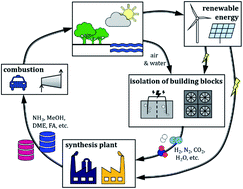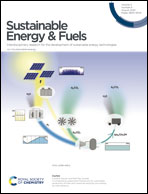A comparative assessment framework for sustainable production of fuels and chemicals explicitly accounting for intermittency
Abstract
The ubiquity of fossil fuels in the provision of mobility services and in the production of platform chemicals constitutes a substantial fraction of total anthropogenic CO2 emissions and resulting climate change. There is therefore substantial interest in the production of sustainable alternatives. Whilst much attention is directed to the individual elements in the value chain, there is a paucity of work focusing on the performance of the integrated system. To address this gap, we present a novel modelling framework for the design and scheduling of the production of platform chemicals and fuels from just air, water, and renewable energy throughout the year. Optimal routes are determined for solar ammonia and methanol. A combination of hydrogen storage for balancing seasonal intermittency and battery storage for balancing daily intermittency is determined as optimal. It is found that nitrogen-based fuels may offer advantages over carbon-based fuels. The cost of intermittency of renewable energy inputs is found to be as much as two thirds of total cost, again varying by location. This reinforces that future design of chemical plants needs to include a treatment of intermittency and opens questions on how to operate sustainable plants – for instance, operating seasonally, or more flexibly.

- This article is part of the themed collection: Sustainable Energy & Fuels Cover Art


 Please wait while we load your content...
Please wait while we load your content...